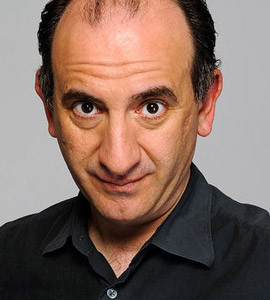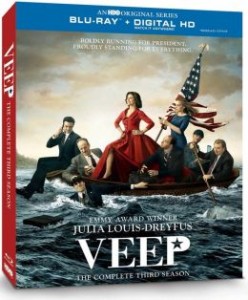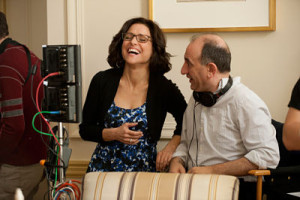 Armando Iannucci is one of the key figures in modern British comedy. The Glasgow native has produced, written and directed a number of critically acclaimed series in the U.K. and now has the attention of American cable networks, thanks to the tremendous success of Veep on HBO. (For her portrayal of Vice President Selina Meyer, star Julia Louis-Dreyfus has won three Emmys for Outstanding Lead Actress in a Comedy Series.)
Armando Iannucci is one of the key figures in modern British comedy. The Glasgow native has produced, written and directed a number of critically acclaimed series in the U.K. and now has the attention of American cable networks, thanks to the tremendous success of Veep on HBO. (For her portrayal of Vice President Selina Meyer, star Julia Louis-Dreyfus has won three Emmys for Outstanding Lead Actress in a Comedy Series.)
The list of performers and writers that Iannucci has worked with thus far reads like a who’s who of British humor. Three career highlights: The Day Today (1994), a surreal, brilliant and highly influential spoof of the news media conceived with Chris Morris; the two series and one feature film that have told the story of pompous talk show host turned celebrity has-been Alan Partridge (played by Steve Coogan); and The Thick of It (2005-2009), the fast-paced, razor sharp political satire that served as the inspiration for Veep.
Veep: The Complete Third Season was released on Blu-ray and DVD on March 31. The show’s fourth season debuts this coming weekend (April 12) on HBO.
Disc Dish: Veep is the antithesis of a show like Altman’s Tanner ’88, in which a fictional presidential candidate interacted with real politicians. Could you talk about your decision not to use the names of real politicians on the show?
Armando Iannucci: I want it to feel as real as possible. We do get requests from real politicians who would like to guest on the show. I think that would tip it into a strange world. That would also make it unreal in a way, because it would draw attention to the artifice, so I try to avoid that.
We are very, very thorough in our research and aim for naturalism in the shooting and the performances. We’ve got the reality we need. A lot of work goes into the writing, and the character say things that characters in the real world would never really have time to think of saying.
DD: Like your previous show The Thick of It, Veep is very precisely edited — so precise sometimes that the scene cuts right after a punchline is said, with no pause for an audience reaction.
AI: [The tightness of the editing] is due to the fact that we shoot very loosely. We film it in a very realistic way, with the cast slightly ad-libbing around the dialogue, so we wind up having lots of material. The first assembly of each episode is usually around 40-50 minutes long. The urge to try and keep as much of it in as possible is what forces us to take any ounce of space out that we can.
It has to do with the fact that we start off having shot something that’s almost an hour long, and what the audience is getting are the high points that move through the story in 30 minutes’ time rather than 50 minutes’ time.
DD: Veep shares with your British series an emphasis on ensemble comedy. Julia Louis-Dreyfus is the star, but the supporting actors have just as much screen time as she does.
AI: I always cast looking for people who feel naturally funny, and I get them to talk in character. I don’t want them just to turn up having learned a page of dialogue and repeat it verbatim. I need to see whether they’re comfortable being in that character when I throw other things at them. Not that I’m expecting them to come up with funny stuff — just that they appear confident, that they can stay in character. Once you do that, you do get a sense of who will be the right fit for this kind of show.
You can usually tell within a minute whether you think they have the right comedy DNA to make the character work.
DD: The show is an extremely American comedy series, but your team of directors and writers are all British, mostly veterans of The Thick of It. Did you want to stick with a winning team?
AI: You don’t have to have been born in a fictional fantasy kingdom in order to write a script for Game of Thrones, nor do you have to be in the New Jersey mafia to write The Sopranos. All writers write from an element of what they know, and a bigger element of what they don’t know but just imagine. Maybe it helps that we come from outside the American political system so that we’re able to examine it objectively. We haven’t grown up in a Democratic family or a Republican family, so we can be a little bit more objective. I think it kind of helps.
I’ve also found that America is a very generous country, and at no point has anyone expressed resentment that we’ve come in and are making comedy at American politics’ expense. It’s a thing that I’ve grown to value more and more, just how generous the American mindset is.
DD: Edgar Wright has referred to the unlikeable but eminently watchable antiheroes of U.K. television (starting with Basil Fawlty) as “the British grotesques.” You are a co-creator of one of the greatest British grotesques ever, Steve Coogan’s Alan Partridge. You’ve kept this going on Veep — in the first season Selina was adrift, but in the second and third seasons she got meaner and meaner, and the show has gotten funnier as she has gotten meaner.
AI: What we’ve been doing is that we’ve been getting closer and closer to putting her in power, because there are only so many jokes you can make about a vice president having nothing to do. In Season 2, we felt, “let’s give her something to do.” In Season 3, it was “let her run for president, let her see America, let her actually have to declare what she believes in and what she doesn’t believe in….”
 The closer you get to power, I think, the harder your heart and soul become. The more compromises you have to make, the stronger you have to be to withstand the pressure. In this way you start to see the effect that power has on you privately as a person and in your family life. So I think the meanness is a product of the fact that, with each season, we’ve tried to get her closer and closer to the center of power. In Season 4, she’s right in the middle of it.
The closer you get to power, I think, the harder your heart and soul become. The more compromises you have to make, the stronger you have to be to withstand the pressure. In this way you start to see the effect that power has on you privately as a person and in your family life. So I think the meanness is a product of the fact that, with each season, we’ve tried to get her closer and closer to the center of power. In Season 4, she’s right in the middle of it.
DD: You and your writers devised a terrific finale for The Thick of It. Do you have a plan for the eventual ending of Veep?
AI: I have a sort of idea. But how many episodes it will take to get there I don’t know. We don’t plan too far ahead — we kind of know where we’re going to end up when we start a season. And we usually like to end somewhere that’s going to completely reset the whole game, so that the following season is going to be radically different. We’ve done that this season.
There are limits to the terms of office, so obviously there is an inbuilt life-cycle to a story like this one. Given that we’re still editing Season 4, it will probably become a bit clearer in a couple of months’ time where it should be heading.
DD: You brilliantly mocked how the news media fabricates content in The Day Today, and on The Thick of It and Veep you focused on the other side of the coin: the way that politicians and their staffs “spin” stories and create fake news items. Could you talk about the concept of manufactured news?
AI: All of this comes from the rise of social media, the 24-hour news cycle, and the fact that everyone is now a journalist, because everyone carries a phone with a camera and a recording device on it. Therefore everything you say can be filmed by somebody and used against you. Politicians are aware that they’re becoming more and more trapped in this world of “content.”
Younger politicians feel they can tap into this, that they can set up their own YouTube channel and live streaming of their speeches and whatever. It’s like we’re all becoming journalists, even politicians are becoming journalists. I find a lot of the mash-up philosophy of YouTube is what political parties do to each other anyway during election campaigns — they just take each other’s speeches and play around with them. So every politician is becoming his own satirist, really.
|
Buy or Rent Veep: Season Three
|
|||
|---|---|---|---|
 |
|||

Leave a Reply